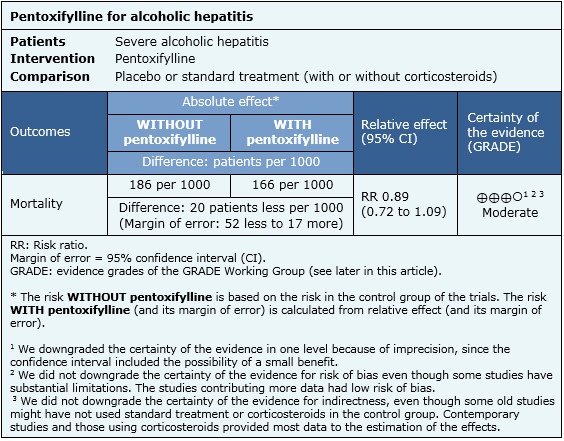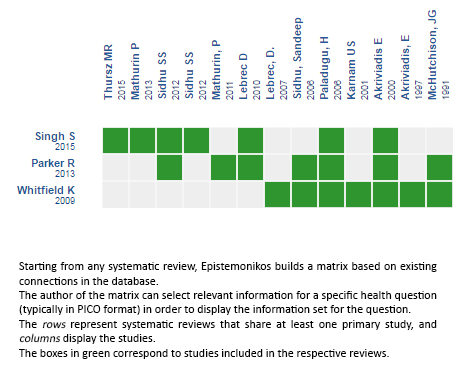Resúmenes Epistemonikos
← vista completaPublicado el 14 de junio de 2016 | http://doi.org/10.5867/medwave.2016.6469
¿Es efectiva la pentoxifilina en hepatitis alcohólica? - Primera actualización
Is pentoxifylline effective in alcoholic hepatitis? –First update
Abstract
ABOUT THE UPDATE: This article updates the June 2014 Living FRISBEE (Living FRISBEE: Living FRIendly Summary of the Body of Evidence using Epistemonikos). It incorporates a new systematic review identifying one study not included in previous reviews. The new evidence leads to substantial changes in the existing evidence.
ASBTRACT: Pentoxifylline is an inhibitor of tumor necrosis factor, and has been proposed as treatment for alcoholic hepatitis. However, it is not clear if it is effective, or if it adds benefit to the treatment with corticosteroids. Searching in Epistemonikos database, which is maintained by screening 30 databases, we identified three systematic reviews including eight randomized controlled trials addressing the question of this article. We combined the evidence using meta-analysis and generated a summary of findings following the GRADE approach. We concluded pentoxifylline probably leads to little or no difference in mortality in alcoholic hepatitis.
About the update
This article is an update of the Living FRISBEE (Living FRISBEE: Living FRIendly Summary of the Body of Evidence using Epistemonikos) published in June 2014 (doi: 10.5867/medwave.2014.06.6002), based on the publication of a new systematic review including an additional randomized trial larger than all previous studies combined.
The new evidence incorporated in this summary leads to a change in the direction of the effect (from benefit to no benefit) with the corresponding modifications in key messages and considerations for decision-making.
Problem
Alcoholic hepatitis is associated to high morbidity and mortality. During the course of the disease an inflammatory process occurs. Corticosteroids have been used because of their antiinflammatory properties, but they are associated to important adverse effects. The oral tumor necrosis factor inhibitor pentoxifylline has been postulated as an alternative for the treatment of alcoholic hepatitis. However, its effects are not clear.
Methods
We used Epistemonikos database, which is maintained by screening more than 30 databases, to identify systematic reviews and their included primary studies. With this information we generated a structured summary using a pre-established format, which includes key messages, a summary of the body of evidence (presented as an evidence matrix in Epistemonikos), meta-analysis of the total of studies, a summary of findings table following the GRADE approach and a table of other considerations for decision-making.
|
Key messages
|
About the body of evidence for this question
|
What is the evidence. |
We found three systematic reviews [1],[2],[3] including eight randomized controlled trials reported in 13 references [4],[5],[6],[7],[8],[9],[10],[11],[12],[13],[14],[15],[16]. |
|
What types of patients were included |
All studies included patients with severe alcoholic hepatitis, generally based on a Maddrey score > 32. Only three studies required histological confirmation of alcoholic hepatitis as inclusion criteria [4],[11],[16]. One study included patients with advanced cirrhosis, with only some patients presenting severe alcoholic hepatitis [4]. Only data on the latter were used in the analysis. |
|
What types of interventions were included |
Pentoxifylline dose was 400 mg t.i.d. in six studies [4],[5],[7],[12],[15],[16]. One study administered 1200 mg q.d. [11] and one study did not report dosification [10]. Duration of treatment was 10 days in one study [11], 28 days in six [5],[9],[10],[14],[15],[16] and 6 months in one [12]. In four studies standard treatment did not include corticosteroids [5],[9],[10],[11] and in three studies both groups received an identical schedule of corticosteroids [4],[14],[16. One trial evaluated both alternatives (pentoxifylline versus placebo, and pentoxifylline plus corticosteroids versus corticosteroids) in different study arms [15]. All of the studies using corticosteroids administered prednisolone. |
|
What types of outcomes |
All of the studies measured short-term mortality, and three also measured long-term mortality (three to six months) [4],[14],[16. Other outcomes assessed in the different systematic reviews were: hepatic mortality, renal dysfunction (hepatorrenal syndrome, serum creatinine elevation), bilirubin plasma levels, and tumor necrosis factor plasma levels. |
Summary of findings
Information on the effects of pentoxifylline for alcoholic hepatitis is based on eight randomized controlled studies involving 1,653 patients. All of the studies reported mortality. The summary of findings is the following:
- Pentoxifylline probably leads to little or no difference in mortality in alcoholic hepatitis compared to placebo, or added to standard treatment. The certainty of the evidence is moderate.


Other considerations for decision-making
|
To whom this evidence does and does not apply |
|
| About the outcomes included in this summary |
|
| Balance between benefits and risks, and certainty of the evidence |
|
| What would patients and their doctors think about this intervention |
|
| Resource considerations |
|
|
Differences between this summary and other sources |
|
| Could this evidence change in the future? |
|
How we conducted this summary
Using automated and collaborative means, we compiled all the relevant evidence for the question of interest and we present it as a matrix of evidence.

Follow the link to access the interactive version: Pentoxyfilline (alone or added to corticosteroids) for acute alcoholic hepatitis
Notes
The upper portion of the matrix of evidence will display a warning of “new evidence” if new systematic reviews are published after the publication of this summary. Even though the project considers the periodical update of these summaries, users are invited to comment in Medwave or to contact the authors through email if they find new evidence and the summary should be updated earlier. After creating an account in Epistemonikos, users will be able to save the matrixes and to receive automated notifications any time new evidence potentially relevant for the question appears.
The details about the methods used to produce these summaries are described here http://dx.doi.org/10.5867/medwave.2014.06.5997.
Epistemonikos foundation is a non-for-profit organization aiming to bring information closer to health decision-makers with technology. Its main development is Epistemonikos database (www.epistemonikos.org).
These summaries follow a rigorous process of internal peer review.
Conflicts of interest
The authors do not have relevant interests to declare.

